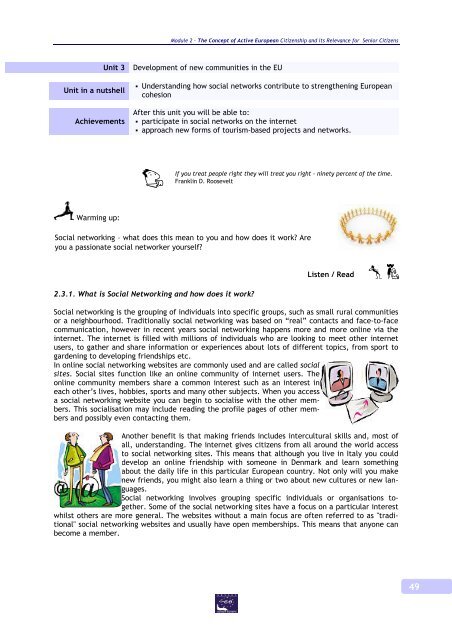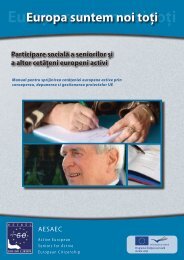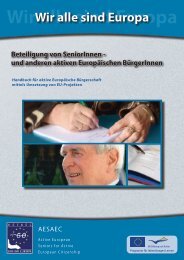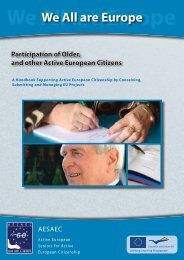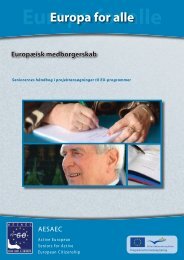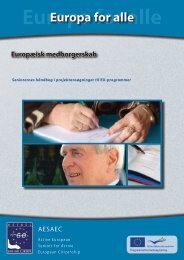We All are Europe - AESAEC
We All are Europe - AESAEC
We All are Europe - AESAEC
Create successful ePaper yourself
Turn your PDF publications into a flip-book with our unique Google optimized e-Paper software.
Module 2 – The Concept of Active <strong>Europe</strong>an Citizenship and its Relevance for Senior Citizens<br />
Unit 3<br />
Unit in a nutshell<br />
Achievements<br />
Development of new communities in the EU<br />
Understanding how social networks contribute to strengthening <strong>Europe</strong>an<br />
cohesion<br />
After this unit you will be able to:<br />
participate in social networks on the internet<br />
approach new forms of tourism-based projects and networks.<br />
If you treat people right they will treat you right - ninety percent of the time.<br />
Franklin D. Roosevelt<br />
Warming up:<br />
Social networking – what does this mean to you and how does it work Are<br />
you a passionate social networker yourself<br />
2.3.1. What is Social Networking and how does it work<br />
Listen / Read<br />
Social networking is the grouping of individuals into specific groups, such as small rural communities<br />
or a neighbourhood. Traditionally social networking was based on “real” contacts and face-to-face<br />
communication, however in recent years social networking happens more and more online via the<br />
internet. The internet is filled with millions of individuals who <strong>are</strong> looking to meet other internet<br />
users, to gather and sh<strong>are</strong> information or experiences about lots of different topics, from sport to<br />
gardening to developing friendships etc.<br />
In online social networking websites <strong>are</strong> commonly used and <strong>are</strong> called social<br />
sites. Social sites function like an online community of internet users. The<br />
online community members sh<strong>are</strong> a common interest such as an interest in<br />
each other’s lives, hobbies, sports and many other subjects. When you access<br />
a social networking website you can begin to socialise with the other members.<br />
This socialisation may include reading the profile pages of other members<br />
and possibly even contacting them.<br />
Another benefit is that making friends includes intercultural skills and, most of<br />
all, understanding. The internet gives citizens from all around the world access<br />
to social networking sites. This means that although you live in Italy you could<br />
develop an online friendship with someone in Denmark and learn something<br />
about the daily life in this particular <strong>Europe</strong>an country. Not only will you make<br />
new friends, you might also learn a thing or two about new cultures or new languages.<br />
Social networking involves grouping specific individuals or organisations together.<br />
Some of the social networking sites have a focus on a particular interest<br />
whilst others <strong>are</strong> more general. The websites without a main focus <strong>are</strong> often referred to as "traditional"<br />
social networking websites and usually have open memberships. This means that anyone can<br />
become a member.<br />
49


